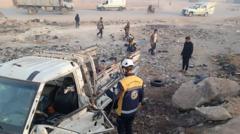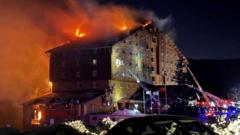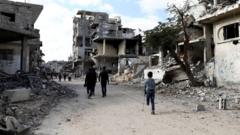Fifteen individuals, primarily women, lost their lives in a horrific car bomb explosion targeting agricultural workers in northern Syria. The attack occurred on the outskirts of Manbij, raising concerns about escalating violence in the region.
Deadly Car Bomb Attack in Northern Syria Claims Lives of Agricultural Workers

Deadly Car Bomb Attack in Northern Syria Claims Lives of Agricultural Workers
A tragic blast near Manbij results in the deaths of 15, mostly women; humanitarian concerns rise as casualties increase.
The Syria Civil Defence, also known as the White Helmets, reported the incident, noting that another 15 women were left injured, with several in critical condition. This incident marks the second major car bomb attack in Manbij within just three days, with previous violence leading to additional civilian casualties. No group has yet claimed responsibility for the attacks, further complicating the ongoing security situation in Syria.
The car bomb attack highlights the persistent instability and dangers faced by civilians in the conflict-ridden northern regions of Syria. Despite the situation being underreported, humanitarian agencies continue to express alarm over the escalating violence and its impact on vulnerable populations. The transient nature of peace in regions like Manbij poses a constant threat to the safety of agricultural workers, who often rely on daily transport to fulfill their jobs.
In light of the attacks, communities are left grappling with grief and fear, as the local infrastructure and safety protocols remain weak. As the international community remains observantly silent on these aggressions, questions linger about the future of stability in a region already ravaged by years of civil war and foreign interventions.
The car bomb attack highlights the persistent instability and dangers faced by civilians in the conflict-ridden northern regions of Syria. Despite the situation being underreported, humanitarian agencies continue to express alarm over the escalating violence and its impact on vulnerable populations. The transient nature of peace in regions like Manbij poses a constant threat to the safety of agricultural workers, who often rely on daily transport to fulfill their jobs.
In light of the attacks, communities are left grappling with grief and fear, as the local infrastructure and safety protocols remain weak. As the international community remains observantly silent on these aggressions, questions linger about the future of stability in a region already ravaged by years of civil war and foreign interventions.




















